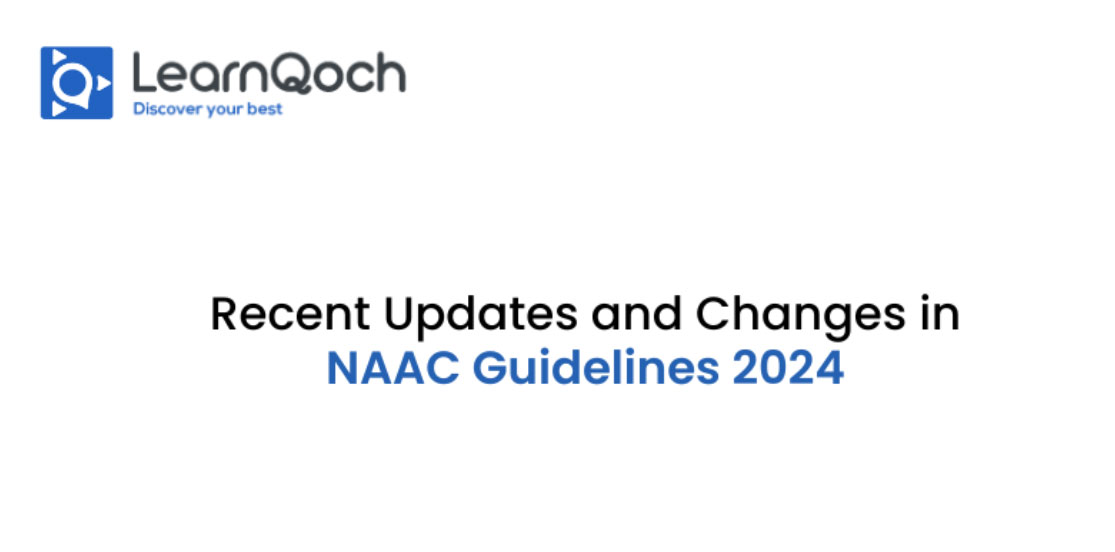Recent Updates and Changes in NAAC Guidelines 2024
In a groundbreaking move, the National Assessment and Accreditation Council (NAAC) has ushered in a new era of transformative reforms in the accreditation process, marking a departure from conventional grading systems. The recent changes, spearheaded by a visionary committee led by Dr. K Radhakrishnan, reflect a strategic alignment with the National Education Policy (NEP) 2020 and a commitment to ushering in a wave of transformative reforms in India’s higher education landscape.
The Evolution: Binary Accreditation and Maturity-Based Graded Accreditation
A) Binary Accreditation:
The traditional grading system is making way for a binary categorization: institutions will now be deemed either “accredited” or “not accredited.” This monumental shift is aimed at encouraging all higher educational institutions (HEIs) to embark on the accreditation journey, fostering a pervasive quality culture within the higher education system. This change aligns with the global trend of simplifying accreditation outcomes, allowing institutions to focus on the process rather than fixate on grades.
B) Maturity-Based Graded Accreditation (MBGA):
Under the MBGA framework, HEIs will be classified into levels ranging from Level 1 to Level 5. The strategic intent is to motivate accredited institutions to ascend through the levels, starting from ‘Institutions of National Excellence’ (Level 1 to Level 4) and reaching the pinnacle as ‘Institutions of Global Excellence for Multi-Disciplinary Research and Education’ (Level 5). This nuanced approach recognizes and rewards institutions for their commitment to continuous improvement, echoing global best practices.
Vision Behind the Reforms
The reforms prioritize evaluating processes, outcomes, and impact across various attributes of HEIs over a solely input-centric approach. This visionary shift underscores the commitment to fostering healthy competition, promoting a culture of continuous improvement, and providing institutions with an incentive to elevate their quality standards.
One Nation One Data Platform:
A proposed One Nation One Data Platform aims to ensure the integrity and transparency of managing institutional data. This centralized platform will facilitate a comprehensive and standardized approach to data management, aligning with the broader vision of transparency and accountability in the higher education sector.
Important Timelines for Implementation
The reforms will be rolled out in two stages:
- Binary Accreditation (Next Four Months):
- During this period, no new applications will be accepted under the current methodology.
- Institutions applying within the next four months can choose between the existing process or the new binary accreditation methodology.
- Maturity-Based Graded Accreditation (December 2024):
- The implementation of the MBGA framework is slated for December 2024, providing institutions with a timeline to prepare for the transition.
LearnQoch’s Perspective: Navigating Excellence
LearnQoch, an integrated ERP and LMS software, welcomes these sweeping reforms initiated by NAAC. The move towards a binary accreditation system and the nuanced approach of MBGA resonate with LearnQoch’s ethos of fostering a holistic educational ecosystem.
Focusing on Student-Centric Ecosystem:
LearnQoch advocates for a substantial focus on creating student-centric ecosystems within HEIs. The reforms present an opportunity for institutions to channel their efforts into enhancing the overall learning experience for students, promoting engagement, and ensuring the development of industry-ready graduates.
Emphasizing Research and Tech Infrastructure:
LearnQoch recognizes the pivotal role of research and technology infrastructure in shaping the future of higher education. These reforms provide an impetus for institutions to invest in cutting-edge research methodologies, faculty development, and technology innovation. LearnQoch envisions HEIs becoming not just centers of education but hubs of innovation and knowledge creation.
Nurturing Learner Engagement:
LearnQoch underscores the importance of nurturing learner engagement within institutions. The focus on quality enhancement, as emphasized by the reforms, aligns with LearnQoch’s commitment to providing tools and platforms that enhance the overall learning experience, making education more interactive, accessible, and impactful.
NAAC’s Role as a Catalyst for Excellence
NAAC ratings have historically been catalysts for motivation within HEIs, inspiring them to focus on research methodology, faculty development, technological innovation, and curriculum development. These reforms signal a new phase of institutional excellence, where accreditation becomes a strategic tool for continuous improvement.
Paving the Way for Excellence
In conclusion, NAAC’s recent updates and changes in accreditation guidelines mark a pivotal moment in the evolution of India’s higher education landscape. The shift towards binary accreditation and the introduction of MBGA reflect a commitment to global best practices, transparency, and continuous improvement.
As institutions embark on this transformative journey, LearnQoch stands as a steadfast ally, providing a comprehensive platform that aligns with the vision of excellence and innovation. Together, NAAC’s reforms and LearnQoch’s advocacy pave the way for a future where institutions not only meet accreditation standards but surpass them, creating an educational ecosystem that nurtures excellence, innovation, and a profound impact on learners.
To enhance Accreditation-related data & enhance the quality assurance standards of your institution, choose LearnQoch Software.
Call us at +91 84519 01079 or email at info@learnqoch.com

